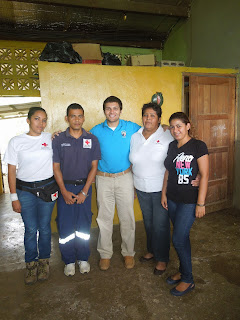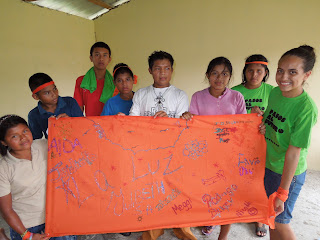Every day in Peace Corps can be a roller coaster, with plenty of ups and downs. Days can seem to go on forever. Yet somehow the end of the week comes too quickly and the work we should have gotten done remains on our agenda. You know, just how life is.
So, this was the status I posted on Facebook this Wednesday:
I awoke at 3:45am with ganas de orinar. After coming back inside I saw a scorpion. Oh, heck no, Mr. Scorpion. I slapped him with my sandal, but kept my hand pressed down on the wall. He stung me just before I let him fall and pummeled his tiny body into oblivion. My middle finger went numb and pain radiated through my hand. Also, my lips tingled. A year and a half of being an overall bad ass scorpion slayer and NOW I get stung...and I'll have you know I only cried for twenty minutes. (1. Bonus points if you know what I'm referencing. 2. Am I joking?) I went to school with a funny sensation in my finger and far too much mucus. Later, a visit from a Peace Corps superior made me feel better about my work, its potential impact, and the future of the program. I ran some errands for my host mom after she fed my boss and me lunch, which involved walking back and forth to several stores in the blazing sun. Then, a student who NEVER approached me before asked me for English help, and we set up a time to meet later. I arrived to his house on time. After waiting a bit too long I debated going home, but he eventually arrived and I helped him for a good hour and a half. I finally felt like I was helping some of the older kids I never see. Now I think I'll just chill with a cat on my lap and watch The Wire.
Yeah, getting stung by a scorpion sucked. Even now my left middle finger hurts a bit. If I pick up something and push a pressure point, I get a stabbing pain at the site of the sting.
Yet I still have (had?) reason to believe my day was a good one. Later on Wednesday, one of the staff members of the Teaching English project came to visit. Her meeting with me was filled with so much content that it's kind of hard to keep it all straight. What I gleaned, though, is that the project, after three years of existence, is willing to start embracing the need for drastic change on many levels. She was considering many options which could give us the chance to collaborate with new government agencies (or different departments within those agencies) in order to effect change more directly. Sounds all fine and good to me.
Then, she asked me if I want to extend my service. I go back and forth on this every day. I had the chance to apply for a position that would have kept me until June, but I somewhat intentionally missed the deadline. I was home and enjoyed that too much to even think about work. Now, there are still a few positions that would allow me to stay, but I don't know if I want to. My visit home sort of pulled me back, made me think my heart is really elsewhere. Or perhaps, just like I was doing for the entire application process of Peace Corps, my mind can't help but be fixated on the next step of my journey.
The meeting went well. During a conversation with the three of us (Peace Corps staff, teacher, and me) I think my counterpart felt a nice, subtle push in the right direction. So of course the next day he talks about how we should sit down to plan. But then today, when it gets right down to planning, the only thing he sits down to do is set in stone our plans for English Week, which we already knew. I was HOPING he would actually tell me where he's going with all his classes, IN DEPTH. It's almost embarrassing to me when I go into his classrooms and have to wonder what he's doing. Shouldn't we be collaborating on this? So, my pre-meeting mindset was actually more realistic. Riding a high from having an optimistic staff meeting is nice, but I need to keep several things in mind:
A) I haven't done the kind of work she (and the whole project) suggests EVER. My teacher and I have only occasionally scratched the surface, and then have backpedaled to the point of serious frustration on my part.
B) My counterpart, like many Panamanians, is great at talking the big game. That's how this and many other schools got a volunteer in the first place. "Sir, are you willing to collaborate with the volunteer and implement co-planning and co-teaching as outlined in our project's action plan?" "Why, yes, person offering to give me a white person for two whole years. Whatever you say." So his ability to smooth talk the staff member and make our work seem more legitimate has little to no basis. UGH!
Then yesterday was mostly shot for two reasons: one) the kids started band practice for the November celebrations and two) we were preparing for a visit from the image of Panama's patron saint. Today was off because it's Friday and everyone's checked out on Friday. So, like I always do, I leave with so many things I know I should have said.
At this point I think, does it really matter what I do? What if by some miracle I get through to my counterpart and am able to give him feedback, able to co-plan and co-teach, and do some good work? It'll only be four months until school's over. And after that I'm done in the school. When school starts next year, I won't be there. So nothing will stop him from yelling at kids to copy faster. "Jesus Christ, you're like an old lady." Nothing will stop him from flexing on kids, threatening to hit them, actually hitting them with paper or pencils, and the like. No one will be there to call him out when he tells a kid that, the next time they make a mistake in Spanish, we'll send him to the indigenous reservation, because only stupid
indios make mistakes like that. I have an entire notebook filled with awful things he's said and suggestions for improvement not only on how to better treat kids, how to better manage his classroom, but also how to make English more engaging, less about copying and more about speaking, having fun, getting the kids out of their notebooks, thinking for themselves. But I wonder, does he even care? If not, why should I?
I use other projects to keep my mind off lack of development on the main teaching front. Right now my main secondary project, a regional competition to take place September 20th, is going at about a snail's pace. I can't expect too much, since it's our first run, but I was hoping for more enthusiasm. It sort of peaked back in June, when Becca (another volunteer) and I had explanatory meetings about the technique sorta presentation called Readers Theater. Since then we've sort of put it off, doing one or two meetings and figuring other things out. Only now are we really getting back into the swing of things. So of course that means teachers in the schools who are supposed to be preparing students for the competition have done nothing. Our plan is to visit schools to coach students, but we'd hoped to get support from teachers and not be expected to start from square one. What can I expect though? It's a totally new technique for them and, aside from one meeting, we've given them minimal guidance. I'm hoping the coaching sessions from volunteers will help reinvigorate them.
Hopefully success on this project will allow me to feel accomplished with some sort of finished project on the English teaching front. I could use a small victory on this Teaching English thing, or I'll have to just put
volunteer on my resume. Cuz shoot, ain't barely teaching English, except for "Good morning!" and "How many pencils are there?" and Howareyoufinethankyou!"

















































